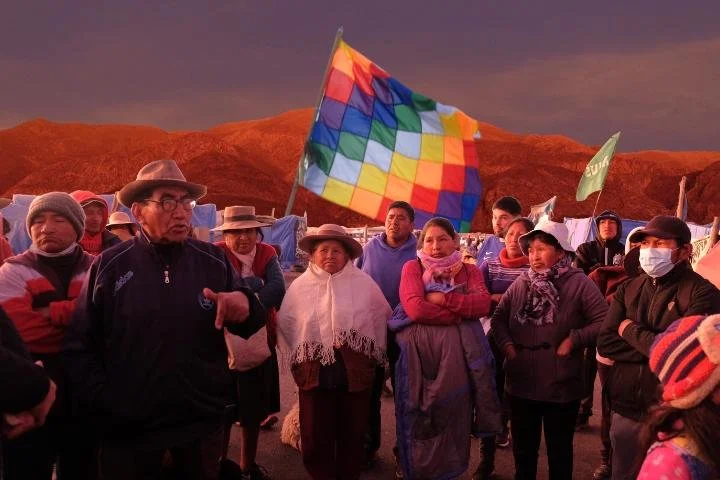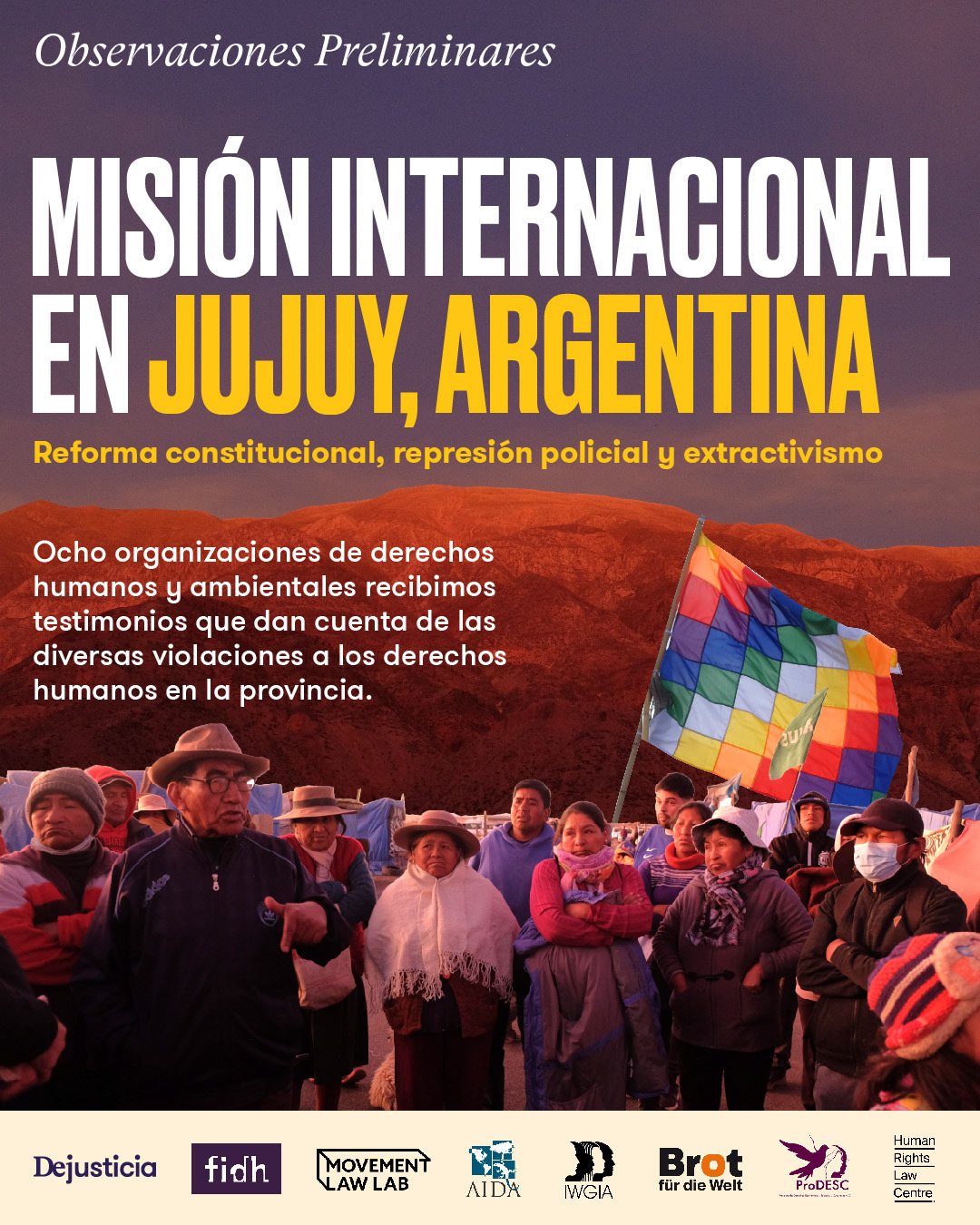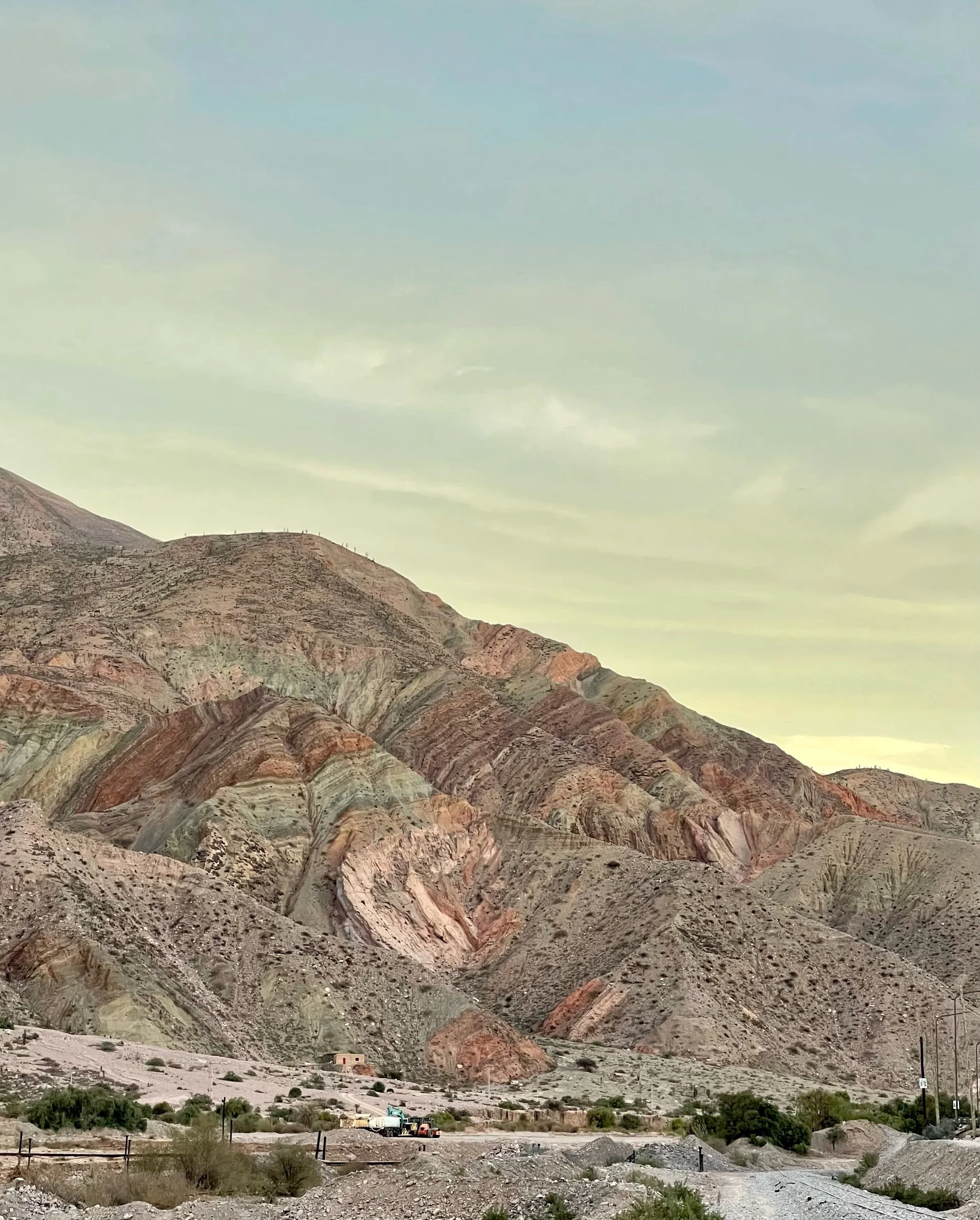Preliminary results of the international mission on human rights
Between 21 August and 25 August 2023, an international observation mission was undertaken by representatives of eight civil society organizations with extensive experience in the field of human rights and environmental rights. The representatives of the mission visited the province of Jujuy, Argentina, to see first-hand the possible violations of the right to protest and the right to participate in public life.
The mission took place within the context of reforms to the provincial constitution—reforms which were approved by the provincial legislature on 16 June 2023. These reforms were made quickly and without allowing sufficient time for extensive public consultation. These reforms seem to have exacerbated the previously existing fracture and polarization in the province and fell well short of creating a climate of democratic coexistence.
The international mission visited the main sources of protest in the last two months including; Abra Pampa, where a road closure was verified by the mission and which was being occupied by representatives of more than 67 communities. The mission also passed through La Quiaca, Salinas Grandes , Susques, Humahuaca, Cruce de San Roque and Purmamarca.
In each of these locations, numerous testimonies were received that account for possible human rights violations, arising from the disproportionate use of force and the use of “less lethal” weapons to disperse protests. As well as arbitrary arrests and the criminalization of human rights defenders through arbitrary criminal processes, including the use of excessive fines.
The international mission spoke with Indigenous communities and land worker associations, as well as with community leaders, unions, human rights organizations, teachers, lawyers and people who reported various forms of violation of both their individual and collective human rights.
The mission also had the opportunity to meet with provincial authorities, including the Minister of Security, the Secretariat for Human Rights and Indigenous Peoples, the Ombudsman's Office, representatives of the Prosecutor's Office, and provincial parliamentarians in San Salvador de Jujuy.
The international mission did not face any impediments or obstacles during its stay in Jujuy, for which it thanks all the actors who offered their points of view on the events that occurred in the context of the constitutional reform.
The members of the international mission are currently analyzing the information obtained in Jujuy, which will be used to prepare a report on the findings of the complex reality of human rights in the province. However, the mission considers it appropriate to make some preliminary observations, with the aim of contributing to rebuilding social dialogue.
These observations are made respecting the autonomy of the community and of the provincial government. They are also based on the obligations that the Argentine State and the provincial government have to protect human rights laws and principles as enshrined in international human rights instruments, as well as from domestic legislation.
A constitutional reform without participation
The international mission was able to verify that, although Indigenous peoples and their communities requested to participate in the constitutional reform procedures, these were carried out without an extensive consultation and deliberation process.
The reform was elaborated and developed without proper consultation and participation mechanisms of Indigenous peoples’ representative institutions. This is despite the large number of Indigenous peoples that live in Jujuy (around 420 communities) and the validity of Convention 169 of the International Labor Organization (ILO) on Indigenous Peoples.
From the information obtained by the mission, concerns have arisen about the incompatibility of the reform with human rights and environmental rights. In particular, the provisions relating to public lands and the absence of mechanisms for the protection of Indigenous peoples who occupy their ancestral lands. The mission reminds the provincial government that Inter-American jurisprudence has recognized that the possession rights of First Peoples must be protected by States.
In the context of the climate crisis and water scarcity, the reform does not adequately address the comprehensive management of basins or the preservation of ecosystems. It seems to favor the large-scale industrial, agricultural and livestock use of water resources and opens the door to concessions that could give rise to the privatization of water, damaging ecosystems and leaving small-scale agriculture and livestock unprotected. This small-scale agriculture is vital for the existence of Indigenous communities.
On the other hand, the reform limits the right to protest, the freedom of expression and the ability for workers to strike by constitutionally prohibiting road closures. The international mission considers that these provisions limit rights that are essential for the democratic rule of law.
In addition to this, the mission received information that reveals an apparent lack of independence of the judiciary in Jujuy. This could make it difficult to assess the constitutionality of the reforms, other laws, or other abuses of authority. The importance of the division of powers and a system of checks and balances must be properly considered in a democratic society.
Environmental impacts and the rights of First Peoples
A concern that was reiterated and expressed by numerous Indigenous communities is that of the harmful impacts of mining activity, in particular, lithium extraction projects that are developed in their territories.
It should be noted that these projects require the intensive use of chemical products and water resources in significant quantities, which puts the sustainability of Andean wetlands and salt flats, and aquifers at risk. This profoundly affects cultural and traditional subsistence practices, as well as the right to a healthy environment. The existence of this issue explains the numerous conflicts and territorial tensions that exist in the mining exploration and exploitation sites in Jujuy.
Repression and criminalization of social protest
Finally, the international mission witnessed testimonies relating to cases of repression of social protest, arbitrary arrests, harassment, and alleged torture by the police against Indigenous peoples and communities, environmental defenders, teachers, youth, women, and even children. As well as the illegitimate and disproportionate use of force, including the use of” less lethal” weapons such as rubber bullets and tear gas that caused damage and injuries, including head and eye injuries. Information was also received about acts of violence towards provincial police officers.
The international mission was able to account for acts of the provincial government and the judiciary that have had a chilling effect on the exercise of the right to protest, which are validated by regulations that limit the exercise of this right. For example, a possible abuse of the criminal legal system was identified which aimed to discourage protests through the use of exaggerated criminal charges or the imposition of fines for large sums of money.
During interviews the mission was able to perceive people’s distrust towards provincial authorities and institutions. The distrust is such that people injured with rubber bullets do not attend to their injuries, including having the bullets removed, for fear that they will be sanctioned or criminalized if they present to public hospitals for medical care.
Next steps
In the following days, the mission will meet with national authorities and with the “Third Rally for Peace” which was organized by Indigenous authorities and is currently located in front of the Courts of Justice in Buenos Aires.
Simultaneously, the information collected by the mission will be analyzed, in order to prepare recommendations for all the actors involved, particularly provincial, national and international authorities. This with the aim of making visible the complex reality of human rights existing in the province of Jujuy, and to contribute to the development of dialogue between the different actors involved for the resolution of social conflict and the respect and full observance of human rights.
Countersigned,
Federación Internacional por los Derechos Humanos (FIDH)
Asociación Interamericana para la Defensa del Ambiente (AIDA)
Pan para el Mundo (PPM)
Proyecto de Derechos Económicos, Sociales y Culturales (Prodesc Mx)
International Work Group for Indigenous Affairs (IWGIA)
Human Rights Law Centre (HRLC)
Centro de Estudios de Derecho, Justicia y Sociedad (Dejusticia)
Movement Law Lab (MLL)






